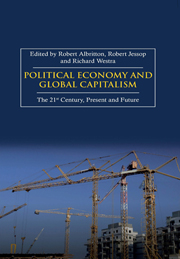Book contents
- Frontmatter
- Contents
- List of Abbreviations
- Notes on Contributors
- Introduction: Political Economy and Global Capitalism
- Part 1 Political Economy of the Present
- Introduction
- 1 Theorizing the Contemporary World: Robert Brenner, Giovanni Arrighi, David Harvey
- 2 Technological Dynamism and the Normative Justification of Global Capitalism
- 3 Eating the Future: Capitalism Out of Joint
- 4 What follows Neo-liberalism? The Deepening Contradictions of US Domination and the Struggle for a New Global Order
- 5 Monetary Policy in the Neo-liberal Transition: A Political Economy Critique of Keynesianism, Monetarism and Inflation Targeting
- Part 2 Political Economy of a Progressive Global Future
- Index
5 - Monetary Policy in the Neo-liberal Transition: A Political Economy Critique of Keynesianism, Monetarism and Inflation Targeting
from Part 1 - Political Economy of the Present
Published online by Cambridge University Press: 05 March 2012
- Frontmatter
- Contents
- List of Abbreviations
- Notes on Contributors
- Introduction: Political Economy and Global Capitalism
- Part 1 Political Economy of the Present
- Introduction
- 1 Theorizing the Contemporary World: Robert Brenner, Giovanni Arrighi, David Harvey
- 2 Technological Dynamism and the Normative Justification of Global Capitalism
- 3 Eating the Future: Capitalism Out of Joint
- 4 What follows Neo-liberalism? The Deepening Contradictions of US Domination and the Struggle for a New Global Order
- 5 Monetary Policy in the Neo-liberal Transition: A Political Economy Critique of Keynesianism, Monetarism and Inflation Targeting
- Part 2 Political Economy of a Progressive Global Future
- Index
Summary
The transition from the Keynesian ‘golden age’ to the current ‘age of neo-liberalism’ was one of the defining events of the international political economy in the post-war era. This chapter examines this transition in terms of changes in the theory and practice of monetary policy across these two periods, and their socio-economic implications. It is argued that monetary policy regimes are irreducibly political. They do not simply offer alternative approaches to macroeconomic management; policy regimes also discipline nation states and social actors in different ways. For example, they constrain the choice of economic policy priorities and the use of the available policy tools, influence inter-capitalist relations within and between countries, and limit the demands of the working class. The macroeconomic policy regime is one of the basic features of the system of accumulation. By the same token, crises of the policy regime can bring to light limitations of the hegemonic processes of economic production and social reproduction.
This chapter shows, first, that the demise of Keynesianism was the outcome of intractable social, economic and political problems in the late 1960s and 1970s, including monetary and exchange rate disturbances, social discord and the weakening US hegemony. The neo-liberal transition was the historically specific (contingent) outcome of the search for solutions to these mounting problems in the accumulation process. The development of a new monetary and exchange rate policy regime was one of the decisive aspects of this transition.
- Type
- Chapter
- Information
- Political Economy and Global CapitalismThe 21st Century, Present and Future, pp. 89 - 120Publisher: Anthem PressPrint publication year: 2007
- 2
- Cited by



